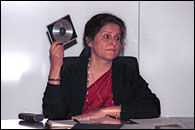Testifying to hatred
 Dr. Syeda Hameed
Dr. Syeda HameedPHOTO: Owen Egan |
|
Dr. Syeda Hameed, of the Muslim Women's Forum in Delhi, delivered the talk "Gender and Genocide: Testimonies of Victims of the Gujarat Carnage" at the McGill Centre for Research and Teaching on Women, September 13.
Hameed was one of six women from across India invited by the non-governmental organization Citizen's Initiative based in the northeastern Indian state of Gujarat to investigate the impact of the recent Gujarat massacre on minority women. Her talk provided fresh insight into the context surrounding the massacre and she called upon her audience to take an active interest in an issue that has not received much media attention in the West. The violence affects us all -- "it's become everybody's business in a shrinking world. We can no longer speak of any 'local,' 'national' or 'international' issue. We should all feel angry about what has happened. Women of the world should unite against other women being burned, mutilated, raped. It should never happen again."
In Gujarat, 2,000 Muslim women, men and children were killed. Hameed underlined how this massacre was not spontaneous, unlike previous episodes of violence in the region, but "state engineered." She asserts, "This was not a communal riot. This was a state-sponsored pogrom. The state was complicit, the state aided and abetted, the state looked away."
The BJP (Hindu nationalist) state government used an incident that occurred the day before as justification for attacking the state's Muslim community. On February 27, a train carrying Hindu nationalists committed to building a temple on the site of the now demolished Babri mosque at Ayodhya was attacked. Fifty-eight people burned to death, including 26 women and 12 children. The town, Ghodra, in which the train was attacked is predominantly Muslim. Rumours circulated that a Muslim mob was responsible or that the Pakistani government was involved, but fresh evidence reported by Hameed reveals that the train could not have been set on fire from the outside. Whatever the (still unknown) motive, the Ghodra incident was "the starting point for the Gujarat carnage. Prosperous Gujarat, the birthplace of Gandhi, became a burning cauldron where genocide and ethnic cleansing took place."
The massacre "was pre-planned and, systematically, all the Muslim establishments were destroyed." Mobs descended with computer printouts of the addresses of Muslim homes and businesses, and co-ordinated their killing with cell phones. The police did not intervene and even led some of the attacks —firing on Muslims, or leading them directly into the arms of the mob. Hameed pointed out that any massacre can be put down within 24 hours -- "you simply come and start shooting." However, in the case of Gujarat, the army was only called in after 36 hours, and even then, it was not immediately deployed. "Why?" asks Hameed. She drew attention to the steady "saffronization" or Hinduizing of the police and civil service under the BJP as one of the key reasons the massacre was so successful.
The Gujarat massacre "has left in its wake deprivation, despondency and desperation." Today over 100,000 refugees are crowded into relief camps that receive little, if any, humanitarian assistance from the government.
The Gujarat massacre was unprecedented in the extent to which sexual violence was used as a tool of war. Hameed notes that "women's bodies have been used as battlegrounds, weapons and to settle scores." Women were brutally gang raped, cut, mutilated, and then burned. The survivors are now in squalid refugee camps, devastated and in severe trauma. Police refuse to record their testimony if they mention names, and the media has been silent on the issue of rape.
The report Hameed co-authored, entitled "The Survivors Speak: How Has the Gujarat Massacre Affected Minority Women?", ensures that their voices are not lost and serves as a reminder that justice has yet to be done. No one has been punished for their role in the massacre, despite that the vast majority of victims can name their attackers.
Into this bleak picture of hate and violence, Hameed did insert some hope. "Civil society has been mobilized as a result of the massacre. Hindus are standing up in huge numbers against what has happened." The future of Indian democracy is at stake, she said, and the massacre offers the opportunity to organize and mobilize against the Hindu right. The birthplace of Gandhi may yet serve as the catalyst for a movement to preserve India for all its citizens.

